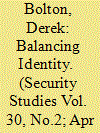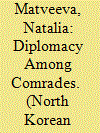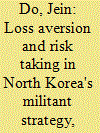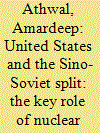| Srl | Item |
| 1 |
ID:
180458


|
|
|
|
|
| Summary/Abstract |
Scholarship on ontological security (OS), the security of being, reveals how national narratives delineate communities within which individuals have OS and how the corresponding self-interest in upholding these narratives influences foreign policy. A hereto-unexplored implication of these works is how the desire to maintain national narratives influences decisions on balancing and bandwagoning. The article uses Raymond Aron’s classical realism to develop an OS theory of balancing, drawing upon what it argues are his “early OS intuitions.” Specifically, using Aron’s concept of “secular religion,” the article shifts the analytical focus of current ideological approaches of balancing toward the “secular religion” of nationalism. It argues decisions on balancing and bandwagoning are made with reference to perceived (in)compatibility between national narratives and the distribution of power. The case of North Korean responses to the Sino-Soviet split demonstrates the utility of an OS perspective on balancing compared to traditional balance of power formulations.
|
|
|
|
|
|
|
|
|
|
|
|
|
|
|
|
| 2 |
ID:
175183


|
|
|
| 3 |
ID:
147342


|
|
|
|
|
| Summary/Abstract |
Studies of North Korean foreign policy are increasingly turning to the thesis advanced by prospect theory of loss aversion and reference dependence to explain its risk taking. Most of these studies focus on the post-1990s as the genesis of North Korea's risk-prone behavior. I show that Pyongyang has operated from a frame of losses since the late 1960s, due to the parallel decline of ideological unity in Soviet–North Korean and Sino–North Korean relations. In particular, from 1967 to 1968, North Korea perceived both allies to be more focused on countering each other than on jointly opposing the United States. Consequently, Pyongyang for the first time saw both Moscow and Beijing as doubtful assets in its bid for hegemonic unification. North Korea therefore stressed the role of small countries in the revolutionary struggle and launched the most violent phase of its militant strategy, emphasizing the US threat as the common enemy. The strategy was therefore in part a function of fear rather than a desire for expansion.
|
|
|
|
|
|
|
|
|
|
|
|
|
|
|
|
| 4 |
ID:
052650


|
|
|
|
|
| Publication |
Apr-Jun 2004.
|
|
|
|
|
|
|
|
|
|
|
|
|
|
|
|